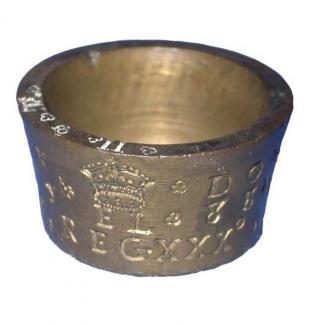
The City of Winchester is fortunate in having in its keeping the oldest surviving set of standard weights, the oldest standard yard measure and a fine collection of other ancient measures and weights. These standard weights and measures would have been used to measure traded commodities and the weights and measures that were used by traders to measure the commodities they sold. This aided both government taxation and fair trade.
Winchester Measure
To trace the origin of the term 'Winchester measure' it is necessary to go back to Anglo-Saxon times, when, during the reign of Alfred The Great (AD 871 to AD 899), Winchester became of increasing importance in the government of the Kingdom and as a centre of trade. In the succeeding reign of Edgar the Peaceful (AD 959 to AD 975) it was decreed that all measures must agree with the standards kept in Winchester and London. From that time on the bushel and its parts - pecks, gallons, quarts and pints - became known as 'Winchester measure' and were used for the measurement of all grains and agricultural produce until it was superseded by the Imperial measure (some 3% larger) in 1824. In the U.S.A. however, the old Winchester bushel continues to be used.
Troy Weight
A Troy weight is the oldest known English commercial weight, the name Troy being commonly believed to have derived from the French city of Troyes which was an important trading centre as far back as the early medieval period. Under this system 1 Troy lb = 12 oz = 240 pennyweights (dwt) = 5760 Troy grains; traditionally a Troy grain is equal in weight to a grain of barley. Seeds provided the earliest weights which is why the terms grain and carat are still used today, grain deriving from the use of the wheat grain and the carat from the seed of the carob plant. Troy weights are now only used for precious metals and gems.
Avoirdupois Weight
The Avoirdupois weight started to develop, through a progression, from the Troy weight in the late 13th/early 14th centuries. The term derives from the Old French term avoir de pois meaning "goods of weight" and developed from the idea that it was the quantity of goods that were being traded not their weight. Under the Avoirdupois system 1lb = 16oz = 7000 grains and 14lb is equal to 1 stone. It is the Avoirdupois system that is being referred to when speaking of the Imperial System.
Wool weights
As already mentioned the Winchester Weights and Measures are standards for the checking of conformity of traded commodities and during the medieval period in England one of the most important trading commodities was wool. By 1421 the customs derived from wool alone amounted to 74 percent of the entire customs revenue of England. Like the pound measurement the stone had also been changing but in 1340, during the reign of Edward III, the stone was set at 14lb. This was possibly to conform to the measures used in some continental European trade centres such as Flanders and therefore the better to facilitate trade. It was also this change that possibly led to the Avoirdupois system becoming preferable to the Troy system. Edward III decreed that a wool sack, which was defined as 2 weights, was to be 26 stones or 364 pounds.


